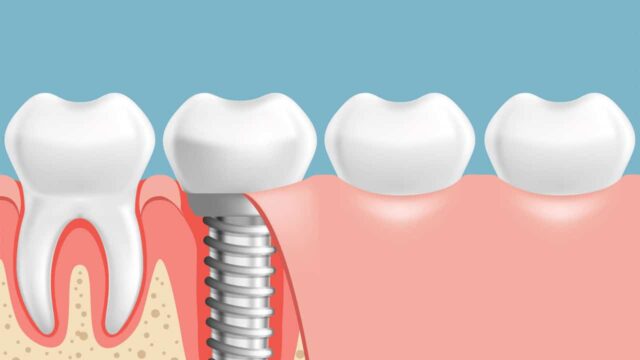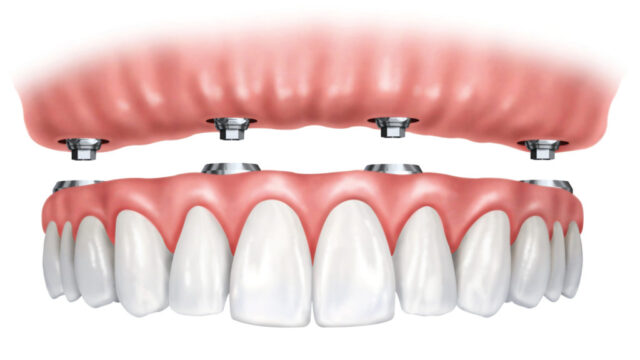
It can be quite challenging to know which type of denture solution is right for you. This is especially hard if it is your first time getting dentures. Two denture solutions that people often have a hard time choosing between are denture implants and traditional dentures.
While both types of dentures are effective for teeth replacement, they each have their own unique features, and hopefully, the guide below helps you make an informed decision.
Denture Implants and Traditional Dentures: What are the Differences?
With denture implants (medically known as implant-supported dentures), four artificial titanium tooth roots are surgically inserted into a patient’s jawbone and are used as an anchor for false teeth to hold on to.
What this essentially means is that the titanium tooth roots become a part of the patient’s jawbone (beneath the gums). Denture Implants offer a host of benefits like; zero risk of falling out or slipping when eating or talking, durability, improved appearance, and teeth function, preserving jawbone strength, no sore spots, and better oral health.

Traditional (complete) dentures, on the other hand, are false teeth that sit snugly on top of the gums. Unlike denture implants, traditional dentures are easily removable. They may also require regular adjustments as they do not prevent the jawbone from shrinking as denture implants do. Traditional dentures may also slip or fall out when you eat certain chewy, sticky, or hard foods.
Choosing Between Denture Implants and Traditional (Complete) Dentures
Before making your choice between denture implants and traditional dentures, there are certain questions you need to ask yourself in order to determine the solution that is best suited to your needs.
Do I want to undergo surgery for my dentures?
With denture implants, two surgeries are usually required to complete the procedure. The first surgery is for the artificial (titanium) tooth roots to be inserted into the jawbone. About 3-6 months will be needed for these implants to fuse with the jawbone, after which the root heads will be placed onto the implants. The root heads are what allow the denture to snap into place.

The denture implant procedure is quite invasive, so it’s important to get them done at a company with a lot of experience like The Denture Shop. If undergoing the two surgeries needed isn’t something you can do, then getting traditional dentures is your go-to option.
How much am I willing to spend upfront on my dentures?
In terms of costs, denture implants do cost significantly higher upfront than traditional (complete) dentures. This is mostly because of the complexity of the prosthesis and the surgical component of getting the implants.
However, when you consider the long-term benefits, denture implants are the better option as they offer more durability and fewer maintenance needs and will not require any adjustments in the future. Please confirm the all on 4 dental implant cost before planning the dental implant treatment.
Are there any factors that may prevent me from receiving denture implants?
Although not very common, there are certain factors that could prevent you from getting denture implants as a teeth replacement solution. They include; existing periodontal disease, bite complications, certain medications (eg. blood thinners), inadequate jawbone density, and smoking.
Bear in mind that while these factors may make you a poor candidate for denture implants, it doesn’t completely take the option off the table. Certain measures can be taken to better your chances of being qualified for the procedure. For example, bone grafts can be done to improve your jawbone density.
Conclusion:
Denture implants and traditional (complete) dentures are both effective teeth replacement solutions that can improve your appearance, smile, speech, and chewing. It is important that you properly understand and speak to your dentist about what each solution entails before making a decision.













